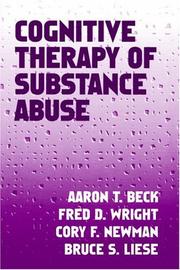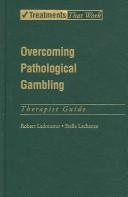| Listing 1 - 9 of 9 |
Sort by
|

ISBN: 0898621151 9780898621150 Year: 1993 Publisher: New York : Guilford Press,
Abstract | Keywords | Export | Availability | Bookmark
 Loading...
Loading...Choose an application
- Reference Manager
- EndNote
- RefWorks (Direct export to RefWorks)
Cognitive Therapy --- Substance abuse --- Substance Abuse --- methods --- Treatment --- therapy --- Cognitive therapy. --- Treatment. --- methods. --- therapy. --- Methods. --- Therapy. --- Cognitive Therapy - methods --- Substance abuse - Treatment --- Substance Abuse - therapy

ISBN: 0190242183 1280704551 9786610704552 0198043139 1429420715 9780198043133 0195317025 9780195317022 0195317033 9780195317039 9781280704550 9781429420716 9780195317015 9780198043126 0195317017 0198043120 0199886350 0190242213 1280846909 9780190242183 6610704554 Year: 2007 Publisher: Oxford ; New York : Oxford University Press,
Abstract | Keywords | Export | Availability | Bookmark
 Loading...
Loading...Choose an application
- Reference Manager
- EndNote
- RefWorks (Direct export to RefWorks)
This Therapist Guide provides clinicians with session-by-session instructions for implementing an effective, CBT-based treatment for pathological gambling. The treatment outlined helps clients to not only overcome their problem, but also to deal with the many consequences of their excessive gambling including financial problems and interpersonal conflicts.
Compulsive gambling --- Pathological gambling --- Problem gambling --- Compulsive behavior --- Gambling --- Impulse control disorders --- Treatment. --- Cognitive Therapy --- Treatment --- methods --- Compulsive gambling - Treatment --- Cognitive Therapy - methods
Book
ISBN: 1108693571 1108693598 1108233171 1108401155 9781108401159 Year: 2019 Publisher: Cambridge : Cambridge University Press,
Abstract | Keywords | Export | Availability | Bookmark
 Loading...
Loading...Choose an application
- Reference Manager
- EndNote
- RefWorks (Direct export to RefWorks)
Avoidant/Restrictive Food Intake Disorder (ARFID) is a common eating disorder diagnosis that describes children and adults who cannot meet their nutritional needs, typically because of sensory sensitivity, fear of adverse consequences and/or apparent lack of interest in eating or food. This book is the first of its kind to offer a specialist treatment, specifically for ARFID. Developed, refined and studied in response to this urgent clinical need, this book outlines a specialiZed cognitive-behavioral treatment: Cognitive-Behavioral Therapy for Avoidant/Restrictive Food Intake Disorder (CBT-AR). This treatment is designed for patients across all age groups, supported by real-life case examples and tools to allow clinicians to apply this new treatment in their own clinical settings.
Feeding and Eating Disorders --- Cognitive Behavioral Therapy --- Eating disorders --- therapy --- methods --- Treatment. --- Feeding and Eating Disorders - therapy --- Cognitive Therapy - methods --- Cognitive Therapy
Book
ISBN: 9782100570140 2100570145 Year: 2012 Publisher: Paris : Dunod,
Abstract | Keywords | Export | Availability | Bookmark
 Loading...
Loading...Choose an application
- Reference Manager
- EndNote
- RefWorks (Direct export to RefWorks)
L’intérêt pour la pleine conscience n’a cessé de se développer depuis ces trente dernières années : aujourd’hui, cette pratique est parfaitement intégrée dans la démarche de soin. La thérapie cognitive basée sur la pleine conscience, MBCT (Mindfulness based cognitive therapy), combine des pratiques ancestrales et des techniques de thérapie comportementale et cognitive (TCC). Précurseurs de cette démarche en France, les auteurs de cet ouvrage répondent aux questions que les lecteurs peuvent se poser sur la démarche, les indications, la pratique, les bénéfices connus et ceux encore en voie d’exploration. Ils décrivent les différentes approches de pleine conscience et le déroulement des séances illustré de nombreux partages d’expériences entre patients et instructeurs.
Mindfulness-based cognitive therapy --- Cognitive therapy --- Thérapie cognitive basée sur la pleine conscience --- Thérapie cognitive --- Cognitive Therapy --- Méthodologie --- methods --- Thérapie cognitive basée sur la pleine conscience --- Thérapie cognitive --- Thérapie cognitive - Méthodologie --- Cognitive Therapy - methods
Book
ISSN: 22680896 ISBN: 9782100758128 2100758128 Year: 2017 Publisher: Malakoff : Dunod,
Abstract | Keywords | Export | Availability | Bookmark
 Loading...
Loading...Choose an application
- Reference Manager
- EndNote
- RefWorks (Direct export to RefWorks)
Tobacco Use Disorder --- Smoking Cessation --- Behavior Therapy --- Cognitive Therapy --- therapy --- methods --- Tabagisme --- Thérapie cognitive --- Thérapie comportementale --- Smoking cessation --- Cognitive therapy --- Behavior therapy --- Thérapeutique --- Thérapie cognitive. --- Thérapie comportementale. --- Thérapeutique. --- Tobacco Use Disorder - therapy --- Behavior Therapy - methods --- Cognitive Therapy - methods
Book
ISBN: 0199885168 0190241926 128205354X 9786612053542 0199724695 9780199724697 9780195300000 0195300009 9780195371024 Year: 2009 Publisher: Oxford ; New York : Oxford University Press,
Abstract | Keywords | Export | Availability | Bookmark
 Loading...
Loading...Choose an application
- Reference Manager
- EndNote
- RefWorks (Direct export to RefWorks)
This therapist guide describes a cognitive-behavioral family intervention for obsessive compulsive disorder (OCD) in young children (ages 5-8). Both parents and children are taught ""tools"" to help them understand, manage and reduce OCD symptoms. Exposure with response prevention (E/RP) is the main component of treatment. In E/RP, the patient is exposed to the feared situation, and the usual response (i.e. the ritual or avoidance behavior) is prevented until anxiety descreases. The corresponding workbook for families reviews skills learned in therapy and includes forms and instructions for ho
Depression, Mental --- Cognitive therapy. --- Cognitive-behavior therapy --- Cognitive-behavioral therapy --- Cognitive psychotherapy --- Psychotherapy --- Treatment. --- Cognitive Therapy --- Depressive Disorder --- Treatment --- therapy --- methods --- Depression, Mental - Treatment --- Depressive Disorder - therapy --- Cognitive Therapy - methods
Book
ISBN: 9780199772667 0199772665 Year: 2011 Publisher: Oxford [England] : Oxford University Press,
Abstract | Keywords | Export | Availability | Bookmark
 Loading...
Loading...Choose an application
- Reference Manager
- EndNote
- RefWorks (Direct export to RefWorks)
Emerging conceptualizations of major emotional disorders emphasize their commonalities rather than their differences, including considerable overlap in disorder phenomenology, a common set of vulnerabilities to development of emotional disorders, and generalization of treatment response across disorders. Current research lends support for a unified transdiagnostic approach to treatment of these disorders that considers these commonalities and is applicable to a range of emotional disorders. Unified Protocol for Transdiagnostic Treatment of Emotional Disorders, part of the TreatmentsThatWork series of therapist manuals and patient workbooks, is a radical departure from disorder-specific treatments of various emotional disorders, and is designed to be applicable to all anxiety and unipolar mood disorders, as well as other disorders with strong emotional components, such as many somatoform and dissociative disorders. The Unified Protocol (UP) capitalizes on the contributions made by cognitive-behavioral theorists by distilling and incorporating the common principles of CBT present in all evidenced based protocols for specific emotional disorders, as well as drawing on the field of emotion science for insights into deficits in emotion regulation. The UP contains seven modules and focuses on four core strategies: becoming mindfully aware of emotional experience; reappraising rigid emotion laden attributions; identifying and preventing behavioral and emotional avoidance; and facilatating exposure to both interoceptive and situational cues associated with emotional experiences. Unified Protocol for Transdiagnostic Treatment of Emotional Disorders will be an essential resource for all therapists and psychiatrists who implement CBT strategies, as well as any clinician treating anxiety and depressive disorders.
Affective disorders --- Cognitive therapy --- Mood Disorders --- Affective Symptoms --- Anxiety Disorders --- Cognitive Therapy --- Treatment --- therapy --- methods --- Klinische psychologie --- therapy. --- methods. --- psychotherapie --- psychotherapie. --- Therapy. --- Methods. --- Psychotherapie. --- Affective disorders - Treatment - Problems, exercises, etc. --- Cognitive therapy - Problems, exercises, etc. --- Mood Disorders - therapy --- Affective Symptoms - therapy --- Anxiety Disorders - therapy --- Cognitive Therapy - methods
Book
ISBN: 9781108401326 9781108416023 9781108235655 1108416020 1108401325 Year: 2019 Publisher: Cambridge: University press,
Abstract | Keywords | Export | Availability | Bookmark
 Loading...
Loading...Choose an application
- Reference Manager
- EndNote
- RefWorks (Direct export to RefWorks)
Childhood anxiety, obsessive-compulsive disorder (OCD) and post-traumatic stress disorder (PTSD) represent some of the most common mental health disorders affecting young people, often leading to major life impairments. This book brings together the world's leaders in treatment science to provide evidence-based psychosocial interventions for these disorders. It supplies practitioners and researchers with innovations in clinical science, highlighting advances in technology and neuroscientific discovery which have informed the development of these novel treatment advances. The authors tackle the two main challenges facing the field of childhood psychopathology: improving access to evidence-based cognitive behavioural therapy (CBT) through innovations in treatment delivery, and increasing the positive outcomes for youth through unique therapies. Any reader who wants to be informed on the latest approaches to cognitive and behavioural interventions and how to apply them will benefit from this book
Anxiety Disorders --- Stress Disorders, Post-Traumatic --- Cognitive Behavioral Therapy --- Anxiété --- Névroses post-traumatiques --- Thérapie cognitive pour enfants --- therapy --- methods. --- Thérapeutique. --- Cognitive Therapy --- Child --- Adolescent --- methods --- Névroses post-traumatiques. --- Thérapie cognitive pour enfants. --- Stress Disorders, Post-Traumatic. --- État de stress post-traumatique. --- Anxiety Disorders - therapy --- Stress Disorders, Post-Traumatic - therapy --- Cognitive Therapy - methods --- therapy.
Book
ISBN: 9780387768700 0387768696 9780387768694 1441945776 9786611927028 1281927023 038776870X Year: 2008 Publisher: New York : Springer,
Abstract | Keywords | Export | Availability | Bookmark
 Loading...
Loading...Choose an application
- Reference Manager
- EndNote
- RefWorks (Direct export to RefWorks)
One of the hallmarks of generalized anxiety disorder, along with diffuse pathological worry and somatic complaints, is its resistance to therapy. Of available treatment modalities for GAD, cognitive-behavioral therapy garners the best empirical support in terms of successful long-term results. Psychological Approaches to Generalized Anxiety Disorder offers clinicians a wide variety of CBT strategies to help clients develop core anxiety-reduction skills, presented so that readers can hone their own clinical skills. Concise without skimping on information, this book reviews current theory and research, addresses important diagnostic issues, and provides salient details in these key areas: Assessment procedures and treatment planning. Latest therapy outcome data, including findings on newer therapies. Specific CBT techniques, including cognitive strategies, psychoeducation, anxiety monitoring, relaxation exercises, and more. Dealing with noncompliance, client ambivalence, and other challenges to therapy. Special considerations for treating older adults with GAD. Relapse prevention, transition issues, and ending treatment. Psychological Approaches to Generalized Anxiety Disorder has much information of interest to new and seasoned clinicians, clinical researchers, and academic psychologists. It is also an especially valuable reference for graduate students treating or studying the anxiety spectrum.
Philosophy (General). --- Psychology, clinical. --- Applied psychology. --- Psychology. --- Clinical Psychology. --- Health Psychology. --- Psychotherapy and Counseling. --- Anxiety Disorders -- psychology. --- Anxiety Disorders -- therapy. --- Anxiety disorders -- Treatment. --- Anxiety disorders. --- Cognitive Therapy -- methods. --- Cognitive therapy. --- Mental Disorders --- Behavior Therapy --- Psychiatry and Psychology --- Psychotherapy --- Behavioral Disciplines and Activities --- Cognitive Therapy --- Anxiety Disorders --- Psychiatry --- Health & Biological Sciences --- Clinical Psychology --- Psychiatric Disorders, Individual --- Anxiety disorders --- Treatment. --- Anxiety neuroses --- Anxiety states, Neurotic --- Neurotic anxiety states --- Cognitive-behavior therapy --- Cognitive-behavioral therapy --- Cognitive psychotherapy --- Clinical psychology. --- Psychotherapy. --- Counseling. --- Health psychology. --- Neuroses --- Psychology, Applied --- Psychological tests --- Applied psychology --- Psychagogy --- Psychology, Practical --- Social psychotechnics --- Psychology --- Counselling --- Helping behavior --- Clinical sociology --- Interviewing --- Personal coaching --- Social case work --- Therapy (Psychotherapy) --- Mental illness --- Mental health counseling --- Health psychology --- Health psychology, Clinical --- Psychology, Clinical health --- Psychology, Health --- Salutogenesis --- Clinical psychology --- Medicine and psychology --- Treatment
| Listing 1 - 9 of 9 |
Sort by
|

 Search
Search Feedback
Feedback About UniCat
About UniCat  Help
Help News
News